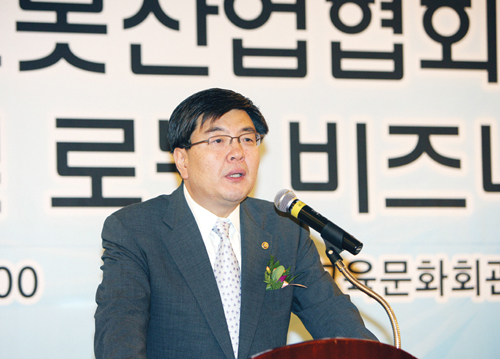Robot Industry Turns 10
Government pledges more investments to foster the industry
 The Korean robot industry celebrates its 10th anniversary. The Robotics Research Cooperative was established in 1999 in Korea to lay the foundation for the Korean robot industry by carrying out such projects as the state-financed R&D project on the development of infrastructure technologies of personal robots. This body was consolidated with the Korea Intelligent Robot Industry Association under the umbrella of the now-defunct Ministry of Telecommunications to give birth to the current Korea Association of Robot Industry (KAR), which now has137 member companies. In a ceremony to mark its 10th anniversary, KAR presented awards to nine people including Prof. Kim Sung-kwon of Korea Polytechnic University and Kim Ho-won, deputy minister for regulatory reform at the Prime Minister's Office, in recognition for their meritorious contribution to the development of the Korean robot industry.
The Korean robot industry celebrates its 10th anniversary. The Robotics Research Cooperative was established in 1999 in Korea to lay the foundation for the Korean robot industry by carrying out such projects as the state-financed R&D project on the development of infrastructure technologies of personal robots. This body was consolidated with the Korea Intelligent Robot Industry Association under the umbrella of the now-defunct Ministry of Telecommunications to give birth to the current Korea Association of Robot Industry (KAR), which now has137 member companies. In a ceremony to mark its 10th anniversary, KAR presented awards to nine people including Prof. Kim Sung-kwon of Korea Polytechnic University and Kim Ho-won, deputy minister for regulatory reform at the Prime Minister's Office, in recognition for their meritorious contribution to the development of the Korean robot industry.
Approximately 250 people in the robot industry as well as government officials, including Vice Minister Rim Chae-min of the Ministry of Knowledge Economy, attended the ceremony and a business workshop held at the Seoul Kyoyukmunhwahoegwan in Yangjae-dong on June 30.
MKE Vice Minister Rim said in a speech, "The government has invested about 600 billion won in robot R&D in the past seven to eight years, but it is an insufficient amount to meet demands and the government plans to make more investments in keeping with an ambitious vision of moving Korea to among the world's top three robot powerhouses by 2013." Rim made the point that the robot industry needs to converge in all things ranging from software to materials and machinery to electronics to grow, so the industry should be open-minded and embrace diverse fields. He was apparently referring to a failure in the selection of the "Project Direct" of the robot industry due to conflicts between the government, industry, academia and research circles. He said the robot industry community should bear fruit corresponding to investments by the government and that the government itself must implement policies to reflect opinions from industry, academia and research circles with an open-minded attitude.
Prof. Kim said, "It was the right decision to establish a robot association with a forward-looking vision in 1999 when people lacked social consciousness toward robots and we wished to become a force behind the development of the robot industry, which is sure to be a breadwinner of the future." Lee Yong-hoon, chairman of the KAR and concurrently president of Rotem, said those in the robot industry have made many achievements despite the stark situation in which robot makers have closed shop and withdrew from the business and, as the leader of an organization of robot makers, he would play a leading role in the further development of the industry.
Kim Chung-ho, president of Robostar, gave a lecture on the direction of the development of robots for manufacturing.
Shin Kyung-chul, president of Yujin Robot Co., spoke on the commercialization of intelligent robots and business know-how.
Paul Kim, president of Hagisonic Co., lectured on the commercialization of robot parts and business know-how.
Kim Soo-hyun, director of the Ubiquitous Technology Research Center of the Korea Advanced Institute of Science and Technology (KAIST), made a presentation on the current status and forecast of humanoid robots.
Dr. Kim Ji-hoon of KAIST spoke about the future prospects of art and robot markets.
In a related development, the Intelligent Robot Ethics Committee held a workshop and raised issues related to the drafting of the world? first robot ethics chapter, to be announced by the end of 2012.
Committee Chairman Kim Dae-won said his committee was originally scheduled to announce the robot ethics chapter by the end of this year, but put on hold the announcement of the chapter for three years since it takes time to gather opinions from ethics and religious circles and to form a social consensus.
Ethicists at the workshop said that robots cannot become ethically mainstream and the robot ethics chapter should not commit the mistake of recognizing robots, a kind of machinery, as equal to human beings.
Robots engineers contended that the chapter should contain contents that could boost robot markets, rather than clinging too tightly to abstract themes.
The chairman said the forthcoming chapter will be written on the basis of the technological levels of the 2030s, so human beings and robots will not be on an equal footing, and it will be worked out in a practical perspective by taking into account cases in Europe. nw
Vice Minister Rim Chae-min of the Ministry of Knowledge Economy gives a speech at a ceremony to mark the 10th anniversary of the Korea Association of Robot Industry.
3Fl, 292-47, Shindang 6-dong, Chung-gu, Seoul, Korea 100-456
Tel : 82-2-2235-6114 / Fax : 82-2-2235-0799